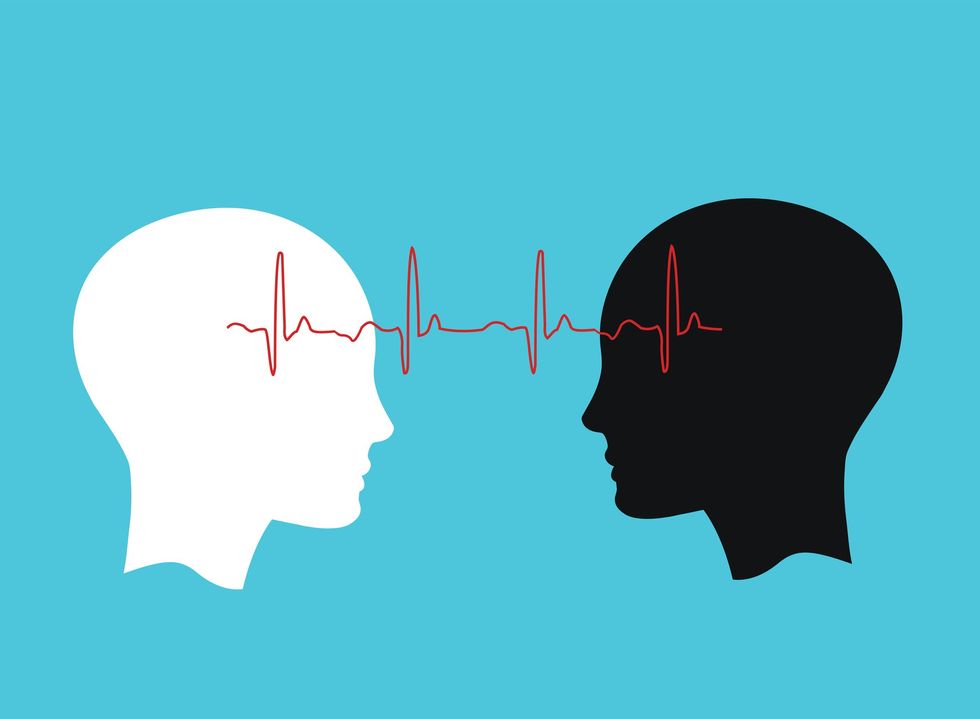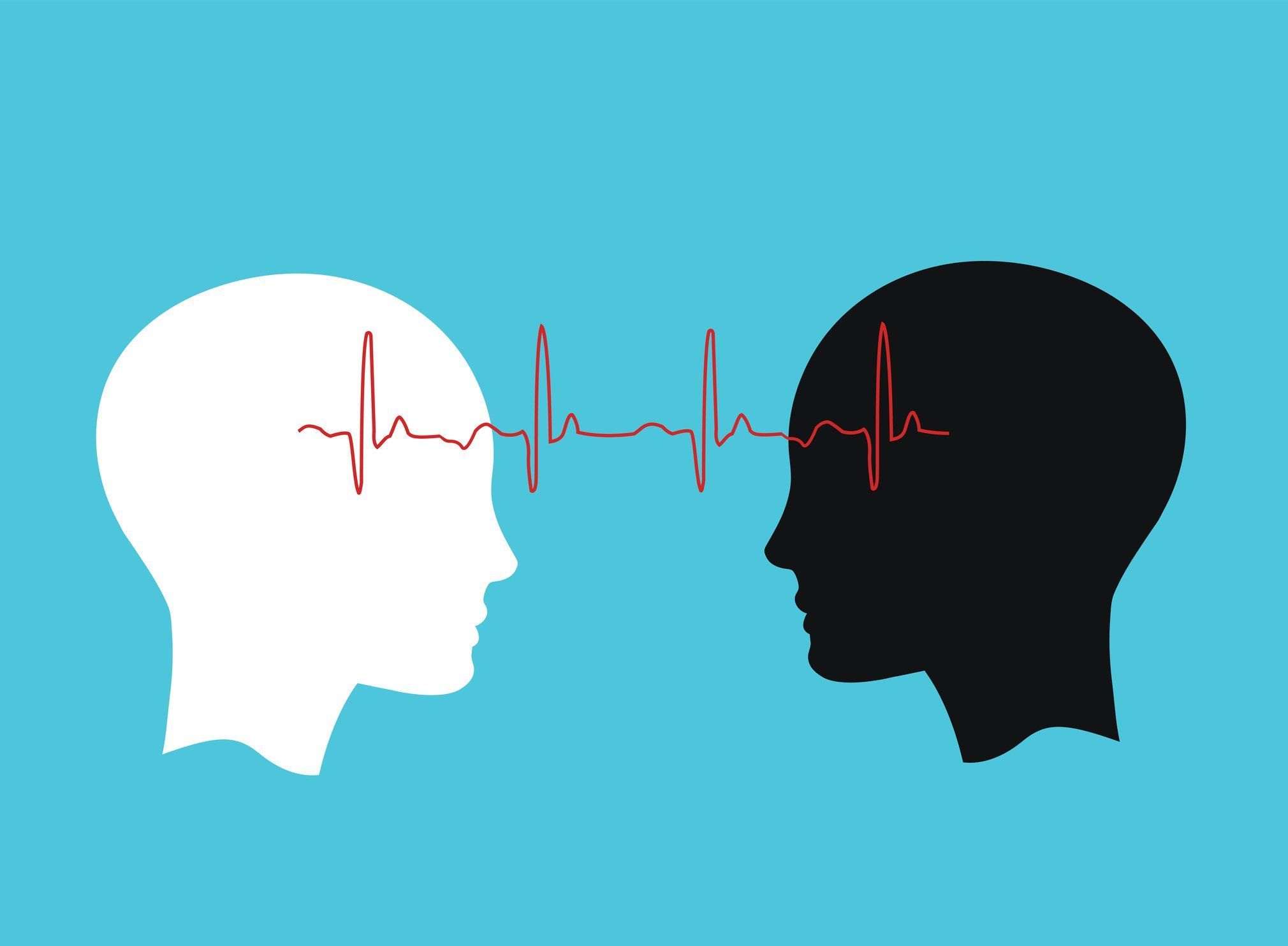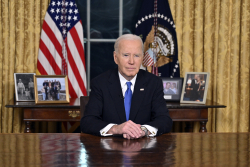

A couple of weeks ago, I woke up to this text message from my friend: “Telepathy Tapes on Spotify. YOU MUST LISTEN.”
It’s not the first time a hyped friend or family member has told me I have to listen to this podcast, watch that video, or read some article. Most of the time, the content people send me is good, but it’s not mind-bending.
This time it was.
I started listening to episode one in the background, intending to get some chores done while I half-listened. It took all of five minutes for me to become completely and totally engrossed. No chores were completed that day.
Episode one opens with this: “For decades, a very specific group of people have been claiming telepathy is happening in their homes and classrooms, and nobody has believed them; nobody has listened to them, but on this podcast, we do.”
While that “we” captures an entire host of cinematographers and scientists, the two main pillars in the show are Ky Dickens, an established documentarian and the host of the series, and the doctor who inspired the podcast, Diane Hennacy Powell, a John Hopkins-trained psychiatrist, neuroscientist, and researcher and former Harvard Medical School faculty member.
Her studies on telepathy, however, have often alienated her from those institutions. At one point, Dr. Powell was even fined and her medical license temporarily revoked for publishing her research. Sadly, in today’s world, that makes me more likely to take an interest in her work. Doctors willing to suffer scrutiny and even outright rejection to get the facts — especially the ones that are incompatible with the political narrative or that don’t fit nicely into the rigid box of Western medicine — are doctors who have my attention.
It’s another phenomenon the scientific community likes to dance around because no one can prove how it’s happening.
Dickens explains early in episode one that studies in extrasensory perception — telepathy, clairvoyance, precognition, and the like — are dismissed by the scientific community because to entertain such concepts requires challenging science’s fiercely guarded modus operandi: materialism, the godless worldview that argues physical matter and the interaction between it are all there is.
The framework contends that if something can’t be explained by physics, then it isn’t real.
As a Christian, I’ve always known this paradigm is fundamentally flawed, void of hope, and deeply arrogant. To witness two non-Christians (and one a medical doctor) boldly rebuff this doctrine and embrace phenomena in the name of truth-seeking, regardless of consequences to their careers and reputations, was as compelling as the research itself.
As I mentioned earlier, the duo explore purported telepathic abilities in a niche population: Non-speaking autistic individuals who face significant motor challenges. Let me paint a picture of what that can look like.
Neurotypicals (people who do not have a cognitive disability) often use phrases like they’re not “all there” to describe these individuals. Historically, doctors have assumed they are unintelligent, have intellectual disabilities, and/or are incapable of typical cognition. Back when I taught high school English, these kids were placed in the “Life Skills” classroom, where they were fed, cleaned, and constantly attended to. The little education they received involved skills you might teach a toddler. On the rare occasion we saw them, they were often making strange, incomprehensible noises, acting in ways that would be considered inappropriate, or staring off into some void.
Now imagine that this population is taught to communicate using letter boards or typing devices.
That is who this podcast centers around.
They’re called “spellers.” And I confess, before I listened to this series, if you’d asked me what a nonverbal autistic person with serious motor challenges would say if taught to communicate, my answer would not have been the most optimistic.
This podcast has been a stern rebuking of sorts. Once they’ve been taught to communicate, all the participants featured in the podcast reveal that they aren’t just “all there” — they’re ultra there. Some are geniuses, others poets. Many are brimming with wisdom that feels like it came from Solomon himself. Most speak of a great cosmic love, claim to access non-earthly realms, purport an afterlife, and exhibit supernatural gifts.
In short, Dr. Powell encountered this fringe group in her studies on savants — that is, people who can do miraculous things, like perform calculus equations, expertly play the piano, or speak eight languages, without ever having been taught. It’s another phenomenon the scientific community likes to dance around because no one can prove how it’s happening.
During these studies, Dr. Powell began receiving emails from parents all over the world claiming their children could read their minds or others’ minds with perfect accuracy. This led to studies in which she tested these claims.
Her conclusion? It’s all true — there are mind readers living among us.
In 2008, she published her work in a book titled “The ESP Enigma: The Scientific Case for Psychic Phenomena.” Years later, Dickens stumbled upon it, was shocked by the information she read, and, after developing a relationship with Dr. Powell, produced a documentary-like podcast called “The Telepathy Tapes,” in which she recreated and expanded Dr. Powell’s original experiments on these remarkable people.
After practically bingeing the entire series and reading through feedback from listeners, something has been bothering me: There seems to be a lack of Christian perspective on “The Telepathy Tapes.” I’ve seen lots of commentary from universalists, spiritualists, and New Agers but literally none from Christians. It could be that the podcast is still gaining traction and hasn’t reached many believers yet, or perhaps Christians are talking about it in circles I’m not privy to.
In either case, “The Telepathy Tapes” demand a Christian response, as the findings and stories outlined in the series can only be described as spiritual. Even more, I think the podcast’s popularity signals a turning of cultural tides toward a re-mystified view of the world, as materialism has failed to offer hope or provide answers to humanity’s most pressing questions.
Christians should be waiting at that juncture with answers.
Miracles on tape
The first half of “The Telepathy Tapes” is devoted almost entirely to experimentation. Dickens conducts a series of tests aimed at assessing non-speakers’ alleged telepathic gifts. Experiments are filmed, and every measure is taken to ensure that cheating is an impossibility. Screens, mirrors, and windows are covered; blindfolds are used; child and parent are often tested in separate spaces so they have zero contact.
From every angle, the experiments certainly seem bulletproof. Video footage of many of the tests can be accessed on thetelepathytapes.com. And yes, I’ve watched them. Either there’s a bunch of very normal-looking families out there using their nonspeaking autistic children to perform reality-warping magic tricks, or psychic phenomena are indeed happening.
Here’s just one example of a test Dickens’ team conducted. A nonverbal autistic college student named Akhil sits across the room facing in the opposite direction from his mother, the person he has mentally merged with. Dickens, using a random word generator, shows his mother a strange, unfamiliar term, ensuring the entire time that it remains out of Akhil’s sight. Using his communication device, he then types the word exactly as his mother is seeing it. He does this again and again, with 100% accuracy. He then moves on to other tests that involve identifying book pages, abstract images, and four-digit numbers his mother views. He never misses a single question.
Akhil is one of several non-speakers the team runs through these kinds of experiments. Every speller they test exhibits the same remarkable ability.
In the second half of the series, Dickens’ team travels around the world, meeting with parents, teachers, non-speakers, and other scientists in the field of ESP. Believe it or not, this part of “The Telepathy Tapes” is even more fascinating than the first.
‘My job on Earth is to make all the Earth hear that God is love.’
The stories these families, teachers, and non-speakers tell are paradigm-shifting.
A former teacher reflects on a non-speaking student she had years ago. One time, when she was grocery shopping, she grabbed a few of his favorite snacks to bring to him the next day at school. Before she ever mentioned the treats, which were locked in her car, he had drawn a picture of every single item she had purchased.
In another incredible anecdote, a mother describes a dream she had when her nonverbal autistic son was young. In the dream, she sees him standing before her, but he speaks and moves normally, free of his earthly restrictions. He presents her with an ace of spades card and urges her to wake up. The next morning, he hands her an ace of spades card, mirroring his action in the dream. She discovers he intentionally entered her dream intending to communicate with her. They begin regularly meeting, speaking, and writing music together via lucid dreaming.
Other fascinating stories include a girl who knows the exact details of the strange event that caused her teacher to be late to school, a boy who places his hand on books and absorbs all the information inside without cracking them open, and a 10-year-old girl who types cryptic warnings before national tragedies occur.
However, in the last few episodes, the podcast takes a hard spiritual turn when Dickens and her research team encounter phenomena and hear stories that don’t just challenge the West’s materialist paradigm but shatter it completely.
The most powerful story by far in the podcast is equal parts tragic and beautiful.
One of the boys featured in “The Telepathy Tapes” dies suddenly from a seizure. Many of his autistic non-speaking friends, however, separately reported that he knew his time was up and had telepathically said his goodbyes to them in the days leading up to his death. At his funeral, these children, using their communication devices, all reported that angels filled the room.
The most powerful line in the podcast comes from a young man named Houston, whose mother believed for the first 17 years of his life that he was practically brain-dead. Once he becomes a speller, his mother discovers he is not only incredibly intelligent but also deeply spiritual.
At one point in the podcast, he types this: “My job on Earth is to make all the Earth hear that God is love. So great is love that no one will have any need to fear when they sink into its depths. … When you’ve seen what I’ve seen, there is no doubt.”
Almost all non-speakers, at least the ones featured in this podcast, speak of God in similar ways, regularly encounter angels, interact with spirits of people who have died, and know information they have no way of accessing. More than one child in the series referred to non-speakers as “light workers.”
Other spiritual strangeness includes a pediatric speech pathologist who sees a body of light hovering above her 4-year-old nonverbal autistic patient, a child savant who speaks numerous languages claiming “God” and “the gods” taught her how to do it, a 7-year-old boy whose very first typed sentence is “God is a good gift giver,” and a boy who hears the specific prayers of a man he’s never seen or met.
One peculiar trait most of these spellers have in common is that their verbiage and syntax are strange and poetic.
One teacher featured in “The Telepathy Tapes,” who’s worked with hundreds of these nonverbal autistic children in the U.S., describes their communication like this: “They have a way of speaking, a style of speaking, that is not of this earth. It’s not English grammar; there’s a lightness to it; there’s often love infused with it; there’s wisdom in there.”
Dickens, after reading hundreds of messages from these gifted people, corroborates this notion when she says they communicate like they’re “from the time of the Torah.”
At this point, the research team has no choice but to contend with the flip side of the materialist worldview: Spiritualism, the idea that reality involves a physical and a non-physical dimension, which interact with each other.
At one point, Dickens asks, “Are we consciousness? Are we an illusion or hologram? Are we spirit? Are we light?” Her skeptical cameraman Michael waxed less poetic when, following a series of miraculous demonstrations, he asks, “Do I have to believe in God now?”
While no one in the podcast emerges from the research with their materialist worldview intact, no one arrives at, or even considers, Christianity either. Their new paradigm, while differing slightly from person to person, is predicated on the belief that consciousness is the foundation of the universe and the source of everything that exists.
What’s disheartening to me is that they’re describing Genesis 1:1.
A great “consciousness” did indeed exist before everything else and is the source of all things. His name is Yahweh. I Am Who I Am. But they can’t make that final leap to the divine, similar to how Big Bang theorists believe in an explosion of light and matter but can’t see they’re reiterating the creation story.
Even still, it’s encouraging to see people who have long rejected the divine open their hearts to the possibility that there is something greater than humanity out there. Perhaps believing in telepathy will be the genesis of a spiritual journey that eventually leads to God.
Prophecy, tongues, and telepathy
As for these non-speakers and their miraculous abilities, my first thought was how unbelievably tragic to be cognitively capable (perhaps excessively so) and deeply spiritual but unable to share that with those around you.
Imagine you encounter angels, write music in your dreams, and have the soul of a poet, but your body betrays you, and so your gifts are invisible to your family, who talk to you like you’re 2 years old, if they talk to you at all. Can you fathom the excruciation?
While the non-speakers featured in “The Telepathy Tapes” are fortunate enough to have families who put them in spelling programs that give them a voice, the truth is that the majority of non-speaking autistic people are never taught to communicate, and so they spend their lives muzzled — their potential shut up in a vault nobody can see. I pray this podcast reaches the families of non-speakers and becomes a doorway to a brighter future for them.
My second thought was: What’s really going on with these people? If they are indeed communicating telepathically, seeing into the spirit realm, and exhibiting other supernatural gifts — and it certainly seems that they are — where did they get these abilities, and why do they have them?
I think the 7-year-old boy I mentioned above whose first sentence was “God is a good gift giver” said the answer. These seem to be gifts from God.
Many of them, we see in scripture. What scientists call precognition — the ability to perceive future events — the Bible calls prophecy. What ESP calls clairvoyance — the ability to perceive information about people, events, or objects beyond the range of normal sensory perception — overlaps significantly with the spiritual gift of “words of knowledge.” Encounters with angelic beings are well documented throughout scripture, as is the gift of godly wisdom, which, as I mentioned, many of these non-speakers appear to have.
Telepathy, however, is not explicitly mentioned in the Bible, unless we’re talking about the omniscient triune God who obviously has access to our thoughts. However, telepathy does share some characteristics of the spiritual gift of speaking in tongues, of which there are two types.
The first type, called “tongues of men,” involves the ability to suddenly speak in a foreign language for the purpose of spreading the gospel. The second type is called “tongues of angels” and involves private prayer spoken in a supernatural language understood only by God. Both are a type of communication that is atypical and not accessible to everyone.
Telepathy is also an atypical mode of communication with specific purposes that is not universally accessible. Similar to tongues of men, telepathy allows non-speakers to communicate with neurotypicals where communication has been impossible. Similar to tongues of angels, non-speakers report that telepathy is their primary mode of communication with other non-speakers, meaning their conversations are private and not accessible to others.
While it is undoubtedly distinct from speaking in tongues, I can’t help but wonder if telepathy could also be a God-given gift of communication, specifically designed for those who have been tragically barred from connecting with the world via speaking. Might it be a bridge to community for people who were made for relationship but struggle to access it?
I don’t know the answers to those questions. I only know that anything that crosses my path must be evaluated by the truth of God’s word. We know from scripture that spiritual gifts are real; we know the Bible is full of strange occurrences; we know God designed all people to exist in relationship with others; and we know He is close to the brokenhearted.
I don’t think it’s far-fetched to speculate that He’s made a way for non-speakers where there was none. God is in the business of way-making. He did it for Noah before the flood, for the Israelites when he parted the Red Sea, for David when he faced Goliath, and, most importantly, for humanity through the sacrifice of Jesus.
People see the cracks in the West’s materialist paradigm and are interested in what powers are blinking through those fissures.
Who’s to say He’s not making a way for this vulnerable population that has been robbed of something so precious as their voice?
That’s not to say, however, that all non-speaking autistic people with these gifts are using them for kingdom work or have personal relationships with Jesus Christ. Some spellers featured in the podcast communicate spiritual ideas that diametrically oppose scripture.
For example, one girl claims that all religions have different names for the same God. Several non-speakers championed the pantheistic or New Age philosophy that the foundation of the cosmos is an impersonal consciousness, free of divine authority — we’re all just beautiful consciousnesses connected to this great universal power, kind of like Eywa in the “Avatar” movies.
These are demonic ideas. So what are we to make of these spellers and their gifts?
Again, I don’t have answers, just conjectures. It seems to me that these non-speakers have at least partial access to the spirit realm — almost as if their consciousness resides somewhere between Earth and the spiritual dimension. Their spiritual messages vary from absolutely true (God is a good gift giver) to absolutely false (Buddha = God), but that makes sense when you consider that the spirit realm is inhabited by both angelic and demonic beings. Some of these heretical ideas must be coming from the demonic beings.
Exceptional as these non-speakers are, they are still human and thus caught up in the spiritual warfare that impacts us all. Their vantage point is just different.
A re-mystified world
Even though Ky Dickens, Dr. Powell, and the vast majority of people involved in “The Telepathy Tapes” land somewhere in the realm of metaphysics or spiritualism — neither of which lead to ultimate truth — I still say the series is a win for God’s kingdom.
The fact that this podcast was produced and is rapidly gaining popularity means that people see the cracks in the West’s materialist paradigm and are interested in what powers are blinking through those fissures. It means people can’t help but be discontented with finality and hope for something infinite. It means we are becoming more human again — sloughing off our robotic “science explains everything” Enlightenment thinking and adopting a more humble approach that doesn’t assume we are the greatest thing in the universe.
This is progress.
For Christians, however, “The Telepathy Tapes” is a reminder that the Bible, while sufficient for our earthly lives, only gives us a small window into our magnificent Creator. In Exodus, He says that no one can gaze upon His face and live. In Isaiah, we are reminded that His ways and thoughts are different from ours. In Job, we are told that no man can fathom the mysteries of God or understand His limitlessness. In Romans, we are warned against even attempting to comprehend His judgments, for no man can know the mind of the Lord.
The book of John concludes with this powerful line: “Jesus did many other things as well. If every one of them were written down, I suppose that even the whole world would not have room for the books that would be written.”
Bottom line: We have been given merely a taste of our Lord.
Sometimes it’s good to be reminded of how much we don’t know. Similar to materialists, Christians also have their worldview rocked when phenomena aren’t easily explained by scripture. We, too, can make the mistake of dismissing something as impossible simply because our doctrine doesn’t explain it. But this makes God in our image. We like things to make sense.
But God has told us that we will never make perfect sense of Him, at least on this side of heaven.
“The Telepathy Tapes,” while strange and paradigm-shifting, has strengthened my faith by reminding me that I don’t have to, nor am I meant to, understand everything about God or His spoken cosmos. No mystery or phenomenon challenges His goodness.

















